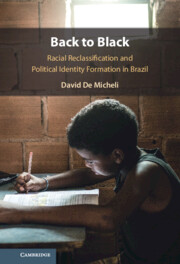
- Cited by 2
-
Cited byCrossref Citations
This Book has been cited by the following publications. This list is generated based on data provided by Crossref.
Morgan, Jana and Kelly, Nathan J. 2025. Ethnoracial Hierarchies and Democratic Commitments. Perspectives on Politics, p. 1.
Freeman, Nicholas C. Telles, Edward E. and Goldberg, Rachel E. 2025. The changing relationship between racial identity and skin color in Brazil. Proceedings of the National Academy of Sciences, Vol. 122, Issue. 1,
- Publisher:
- Cambridge University Press
- Online publication date:
- November 2024
- Print publication year:
- 2024
- Online ISBN:
- 9781009472401
- Subjects:
- Sociology of Race and Ethnicity, Area Studies, Latin American Studies, Politics and International Relations, Latin American Government, Politics and Policy, Sociology


